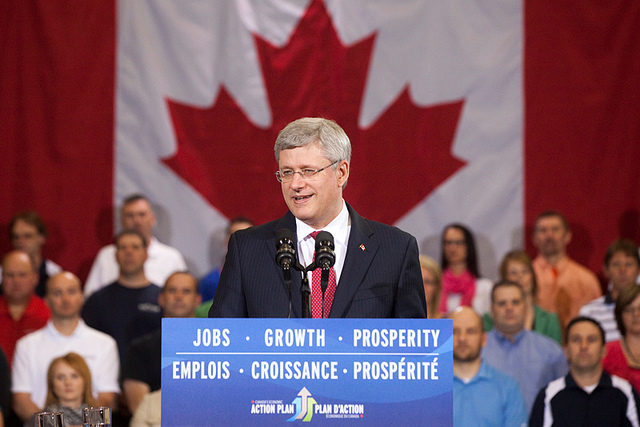You can change the political conversation. Chip in to rabble’s donation drive today!
There is a scene in the hit movie The Book Thief where the young heroine pulls a book out of the embers of a public bonfire. The movie is based on a kid lit book (marketed for older children and adults) of the same title, a literary genre specializing in fright and horror. Set in 1930s Germany, it’s no surprise the fire was ordered by Nazis party officials to eliminate works by Jewish authors.
The Harper government has not yet ordered books be burned. But it is closing seven of the 11 fisheries research libraries across Canada, and what is being lost (buried) is irreplaceable scientific data. Notebooks, records of scientific measurement, and other materials unsuitable for digital recording are irretrievable, lost forever.
It is surprising that a Canadian government would mount an attack on public knowledge — and get away with it. The damage the Harper government is inflicting on science, research and public knowledge-based activities has overwhelmed dissent. While scientists have protested, and professional public servants are organizing to protect research capabilities and capacities, leaders of Canadian universities have been largely silent.
Taking others by surprise is a big part of the strategy employed by the Harper government as it remakes Canada. First sworn in as prime minister eight years ago this month, as head of a minority government following a general election, Harper won a majority in 2011, surprising the country as the Liberal vote collapsed.
While the mainstream media lauded the moderation of the Conservative leader despite his Reform Party roots, Harper was taking risks from his first days in office, pushing the limits of acceptable discourse by trashing climate change as a socialist leftist plot, replacing quiet diplomacy through the United Nations with megaphone diplomacy aimed at domestic constituencies, and cutting government revenues and spending simultaneously, in his relentlessly pursuit of smaller government.
It is a well-understood feature of Canadian public policy that the Canadian prime minister maintains a personal relationship with the American president. For instance, Jean Chrétien was on good terms with George W. Bush despite keeping Canada at a distance from the war mounted against Iraq and sharing few sympathies with the U.S. president.
On the Keystone pipeline, the fervently pro-American Stephen Harper has been working in alliance with Republican opponents to President Obama to get the project approved. Indeed, Stephen Harper may be the first Canadian prime minister to put his relationship with the U.S. president at risk in this way. While the Canadian media kept looking for conflict between Bush and Chrétien, the freeze created by Harper with Obama has received little attention (columnist Lawrence Martin being an exception).
No Canadian prime minister can ignore the regional implications of national policies. For Mackenzie King, cabinet-making was about ensuring all regional perspectives were represented around the table, especially those of French-speaking Quebec.
Stephen Harper has gone ahead with his cuts to social spending and reversals of long-standing commitments without any regard to the wishes of Quebecers. A national minority within a federal state commands attention anywhere in the world. Rather than keeping Quebec close, Harper pushed it away. Because Quebec failed to reward Harper with electoral support he decided not to pay attention. Legitimate concerns about issues such as rail safety or unjust employment insurance rules have simply been ignored. Now there is a sovereignist government in power in Quebec, and a Canadian prime minister with no strategy for dealing with it.
Federal-provincial relations rank alongside Canada-U.S. politics and the place of Quebec within Confederation, as the most important undertakings in Ottawa. Harper has largely ignored this file, preferring to deal with provincial premiers one to one, and leave specific issues to be dealt with by his ministers.
The main goal of the Harper government is to balance the budget, and it has promised to introduce income splitting for couples once the goal is reached, presumably next year, when an election is slated for October. The benefits are designed to be pre-electoral for the Harper government, as higher earnings from one marriage partner can be place into a lower tax bracket of the other partner, reducing the taxes paid per household. But like other Conservative measures, income splitting will hurt the less fortunate.
The surprise in store for the provinces is the reduction in provincial revenues that will result. Since provincial tax rates are calculated on the federal tax base, losses to the federal treasury will be replicated in the provinces.
In 2014, close attention is going to be paid to the personal popularity of Stephen Harper. Buffeted by the Senate scandal, the prime minister’s personal credibility is being undermined by the effective use of House of Commons question period by Thomas Mulcair as leader of the Official Opposition.
In 2013, Harper passed the test of keeping his funding base strong. However, he cannot afford to see support for his party dip to below 20 per cent in public opinion polling, or he will face internal opposition and rampant speculation about his longevity in office. Under these circumstances, it should come as no surprise, if Stephen Harper resigns this year.
Duncan Cameron is the president of rabble.ca and writes a weekly column on politics and current affairs.
Like this article? Chip in to keep stories like these coming!
Photo: pmwebphotos/flickr




